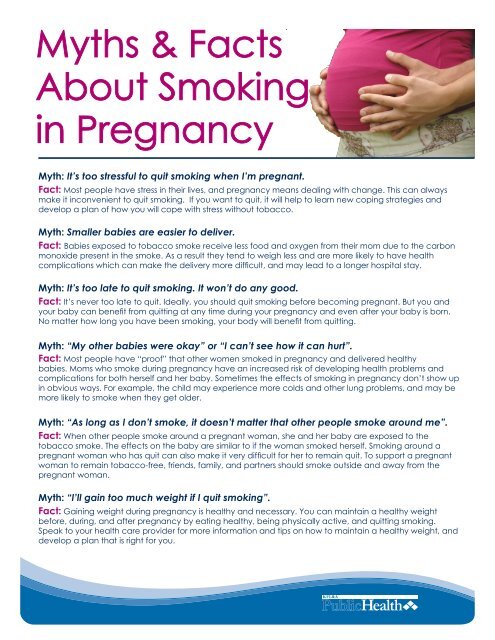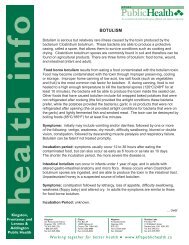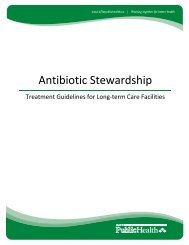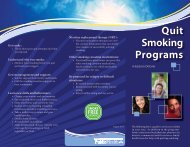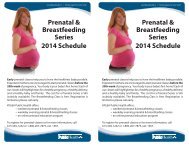Myths & Facts About Smoking in Pregnancy - KFL&A Public Health
Myths & Facts About Smoking in Pregnancy - KFL&A Public Health
Myths & Facts About Smoking in Pregnancy - KFL&A Public Health
Create successful ePaper yourself
Turn your PDF publications into a flip-book with our unique Google optimized e-Paper software.
<strong>Myths</strong> & <strong>Facts</strong><br />
<strong>About</strong> <strong>Smok<strong>in</strong>g</strong><br />
<strong>in</strong> <strong>Pregnancy</strong><br />
Myth: It’s too stressful to quit smok<strong>in</strong>g when I’m pregnant.<br />
Fact: Most people have stress <strong>in</strong> their lives, and pregnancy means deal<strong>in</strong>g with change. This can always<br />
make it <strong>in</strong>convenient to quit smok<strong>in</strong>g. If you want to quit, it will help to learn new cop<strong>in</strong>g strategies and<br />
develop a plan of how you will cope with stress without tobacco.<br />
Myth: Smaller babies are easier to deliver.<br />
Fact: Babies exposed to tobacco smoke receive less food and oxygen from their mom due to the carbon<br />
monoxide present <strong>in</strong> the smoke. As a result they tend to weigh less and are more likely to have health<br />
complications which can make the delivery more difficult, and may lead to a longer hospital stay.<br />
Myth: It’s too late to quit smok<strong>in</strong>g. It won’t do any good.<br />
Fact: It’s never too late to quit. Ideally, you should quit smok<strong>in</strong>g before becom<strong>in</strong>g pregnant. But you and<br />
your baby can benefit from quitt<strong>in</strong>g at any time dur<strong>in</strong>g your pregnancy and even after your baby is born.<br />
No matter how long you have been smok<strong>in</strong>g, your body will benefit from quitt<strong>in</strong>g.<br />
Myth: “My other babies were okay” or “I can’t see how it can hurt”.<br />
Fact: Most people have “proof” that other women smoked <strong>in</strong> pregnancy and delivered healthy<br />
babies. Moms who smoke dur<strong>in</strong>g pregnancy have an <strong>in</strong>creased risk of develop<strong>in</strong>g health problems and<br />
complications for both herself and her baby. Sometimes the effects of smok<strong>in</strong>g <strong>in</strong> pregnancy don’t show up<br />
<strong>in</strong> obvious ways. For example, the child may experience more colds and other lung problems, and may be<br />
more likely to smoke when they get older.<br />
Myth: “As long as I don’t smoke, it doesn’t matter that other people smoke around me”.<br />
Fact: When other people smoke around a pregnant woman, she and her baby are exposed to the<br />
tobacco smoke. The effects on the baby are similar to if the woman smoked herself. <strong>Smok<strong>in</strong>g</strong> around a<br />
pregnant woman who has quit can also make it very difficult for her to rema<strong>in</strong> quit. To support a pregnant<br />
woman to rema<strong>in</strong> tobacco-free, friends, family, and partners should smoke outside and away from the<br />
pregnant woman.<br />
Myth: “I’ll ga<strong>in</strong> too much weight if I quit smok<strong>in</strong>g”.<br />
Fact: Ga<strong>in</strong><strong>in</strong>g weight dur<strong>in</strong>g pregnancy is healthy and necessary. You can ma<strong>in</strong>ta<strong>in</strong> a healthy weight<br />
before, dur<strong>in</strong>g, and after pregnancy by eat<strong>in</strong>g healthy, be<strong>in</strong>g physically active, and quitt<strong>in</strong>g smok<strong>in</strong>g.<br />
Speak to your health care provider for more <strong>in</strong>formation and tips on how to ma<strong>in</strong>ta<strong>in</strong> a healthy weight, and<br />
develop a plan that is right for you.
Myth: “My doctor said not to quit cold turkey because it is dangerous to my baby”.<br />
Fact: Not true. Quitt<strong>in</strong>g smok<strong>in</strong>g <strong>in</strong> pregnancy is safer for you and your baby than cont<strong>in</strong>u<strong>in</strong>g to smoke.<br />
Myth: “If I cut down the number of cigarettes I smoke per day, I won’t do as much harm<br />
to myself or my baby”.<br />
Fact: Cutt<strong>in</strong>g down on the number of cigarettes smoked per day is a great accomplishment, and can be<br />
used as a way to help you get started on your quit plan. However, it does not help to protect you or your<br />
baby from the harm caused by smok<strong>in</strong>g. If your goal is to quit completely, focus on what has motivated<br />
you to cut back as you try to reduce further, and be careful not to <strong>in</strong>hale deeper or take more puffs to get<br />
the same amount of nicot<strong>in</strong>e as before.<br />
Myth: “If I smoke “light” cigarettes that are low <strong>in</strong> nicot<strong>in</strong>e and tar, then I don’t do as<br />
much damage to myself and the baby”.<br />
Fact: Light and mild cigarettes do not reduce harm. Smokers often cover the holes <strong>in</strong> light cigarettes with<br />
either their lips or f<strong>in</strong>gers. This means you get the same amount of tar and nicot<strong>in</strong>e as you do from regular<br />
cigarettes.<br />
Myth: “It will be easier to quit smok<strong>in</strong>g after the baby is born”.<br />
Fact: When the baby is born, you will be adjust<strong>in</strong>g to your new life and rout<strong>in</strong>e. That can be stressful and<br />
you may not want to focus on quitt<strong>in</strong>g smok<strong>in</strong>g and go<strong>in</strong>g through withdrawal. If you can quit smok<strong>in</strong>g<br />
before the baby is born, you will have developed cop<strong>in</strong>g skills and will be better able to cope with the<br />
arrival of your newborn.<br />
Adapted with permission from Pregnets. Pregnets is funded by the Tobacco Control Program, <strong>Health</strong> Canada.<br />
Help is available!<br />
If you are plann<strong>in</strong>g a pregnancy or are pregnant,<br />
breastfeed<strong>in</strong>g, or have recently had a baby, you<br />
and your partner may be eligible for free support<br />
to become tobacco free.<br />
What is available?<br />
• In person support from qualified public health<br />
nurses at your local KFL&A <strong>Public</strong> <strong>Health</strong> office<br />
• Access to subsidized Nicot<strong>in</strong>e Replacement<br />
Therapy<br />
• Options will be offered to help you create your<br />
own personal plan for you and your family.<br />
If you would like more <strong>in</strong>formation or support to become tobacco-free, please call the<br />
Child & Babytalk Phone L<strong>in</strong>e at 613-549-1154 or 1-800-267-7875 ext. 1555<br />
and ask about the Take Control Baby Steps program.<br />
For <strong>in</strong>formation onl<strong>in</strong>e, visit www.pregnets.org.<br />
May 2013


